Abstract
Between 1957 and 1977, 95 patients underwent transduodenal pancreatic sphincteroplasty (TPS) for a diagnosis of recurrent pancreatitis. Five to twenty-five year follow-up was obtained for 89 patients (94%) and was analyzed by life-table method. Short-term successful outcome was defined as relief of symptoms (e.g., pain) for one to three years; long-term successful outcome was defined as those patients who remained symptom-free at time of last follow-up. Operative mortality was 4.2% (4 patients). Fifty-six patients (66%) had a successful short-term outcome. Of these, 13 patients had recurrence of symptoms: 7 occurred at 4 years, 5 at 5 years and 1 at 6 years. Preoperative factors associated with poor short-term outcome were previous upper abdominal surgery (X2 = 5.67, p less than 0.05) and frequent diarrhea (X2 = 6.18, p less than 0.05). Preoperative factors associated with poor long-term outcome were previous upper abdominal surgery (X2 = 7.82, p less than 0.01), heavy alcohol intake (X2 = 4.71, p less than 0.05), narcotic use (X2 = 5.68, p less than 0.05) and frequent diarrhea (X2 = 4.8, p less than 0.05). Morphine Prostigmin Test (MPT) was performed preoperatively in 78 patients (82%). A significantly greater proportion of patients with a rise in serum pancreatic enzymes secondary to MPT (MPT+) had a successful long-term outcome compared with those without such a rise (MPT-) (61% v 41%, X2 = 5.13, p less than 0.05). Furthermore, of the patients with a successful short-term outcome, 88% with MPT+ remained long-term symptom-free compared to 38.5% with MPT- (X2 = 8.36, p less than 0.01). We conclude that TPS can be a successful operation for acute recurrent pancreatitis. Previous upper abdominal operations, signs of more advanced pancreatic disease, preoperative narcotic use and alcohol abuse, were associated with a worse outcome and probably associated with chronic recurrent pancreatitis. Preoperative use of MPT, coupled with accurate clinical history, defined groups with different short- and long-term prognosis after TPS.
Full text
PDF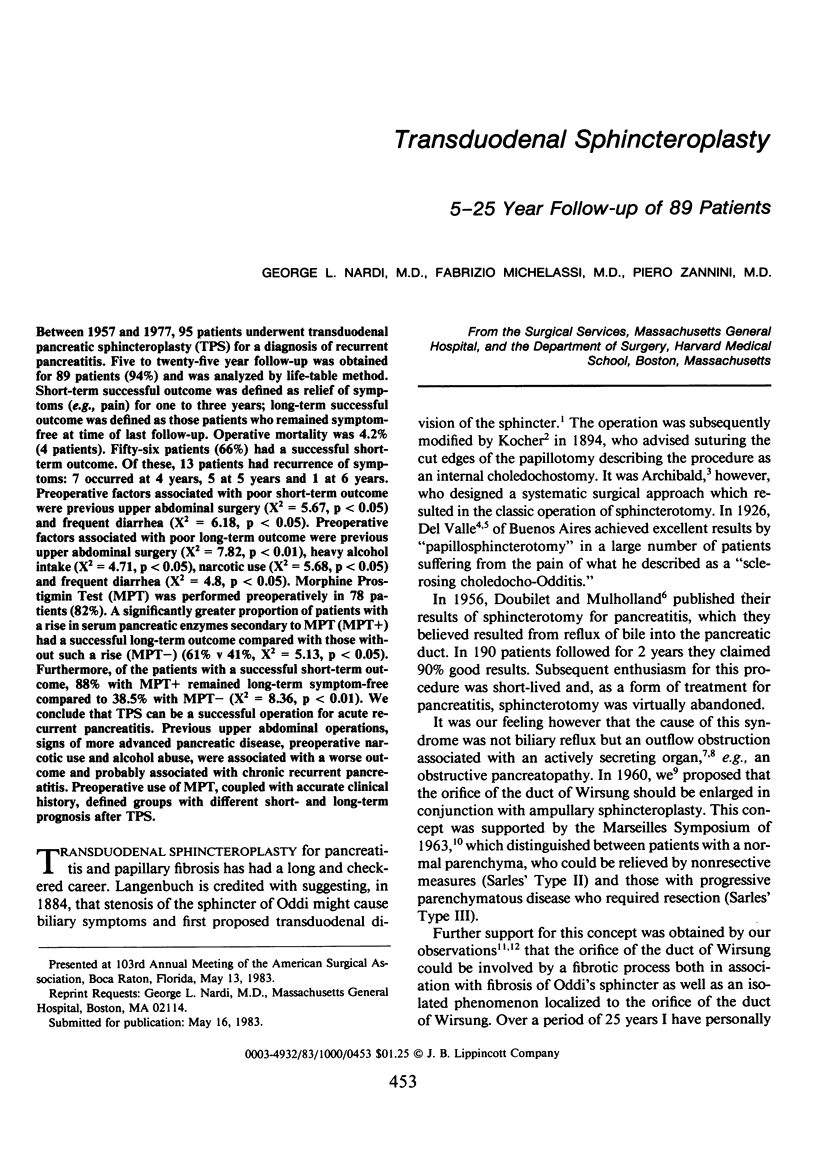
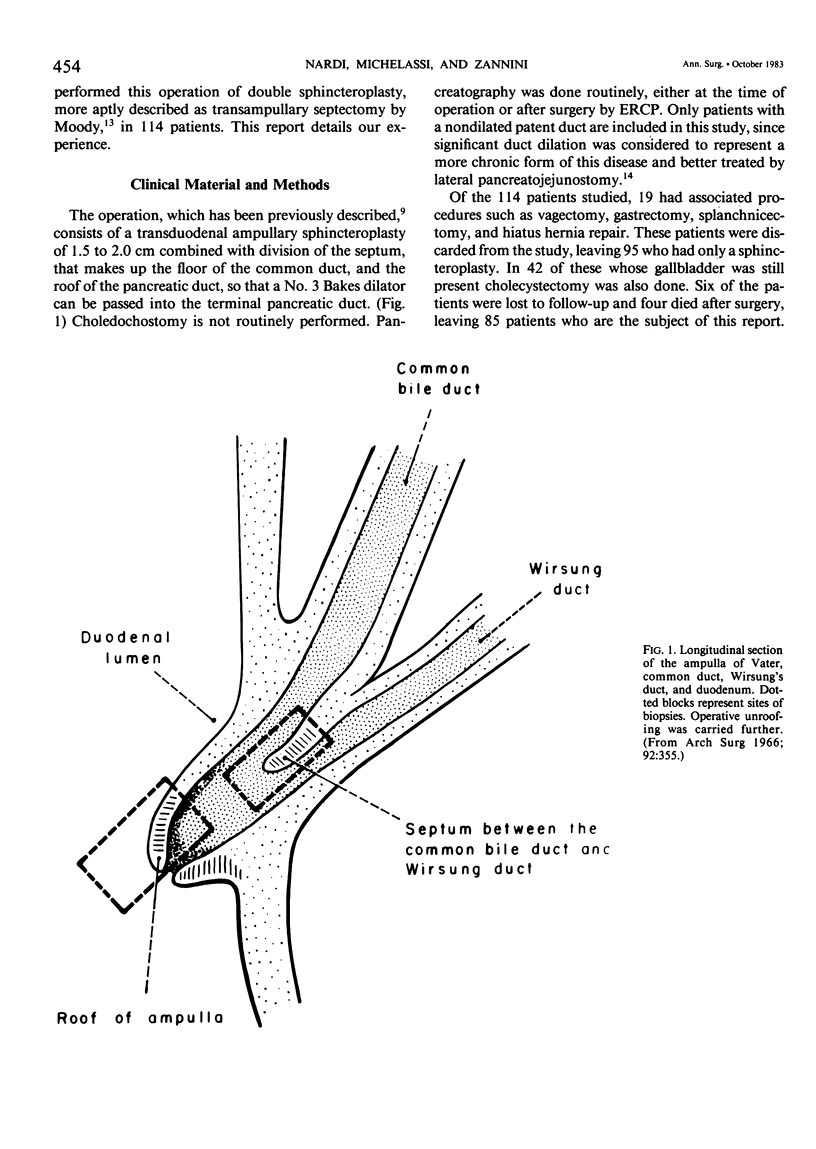
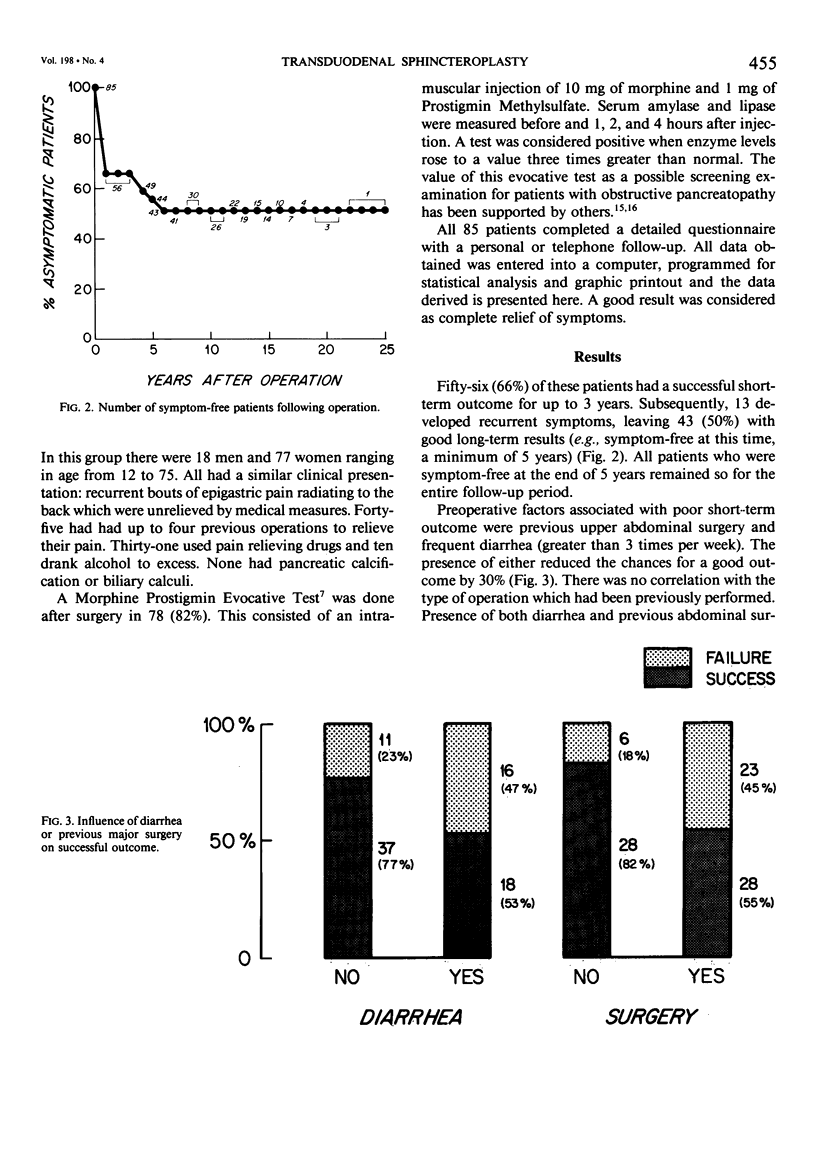
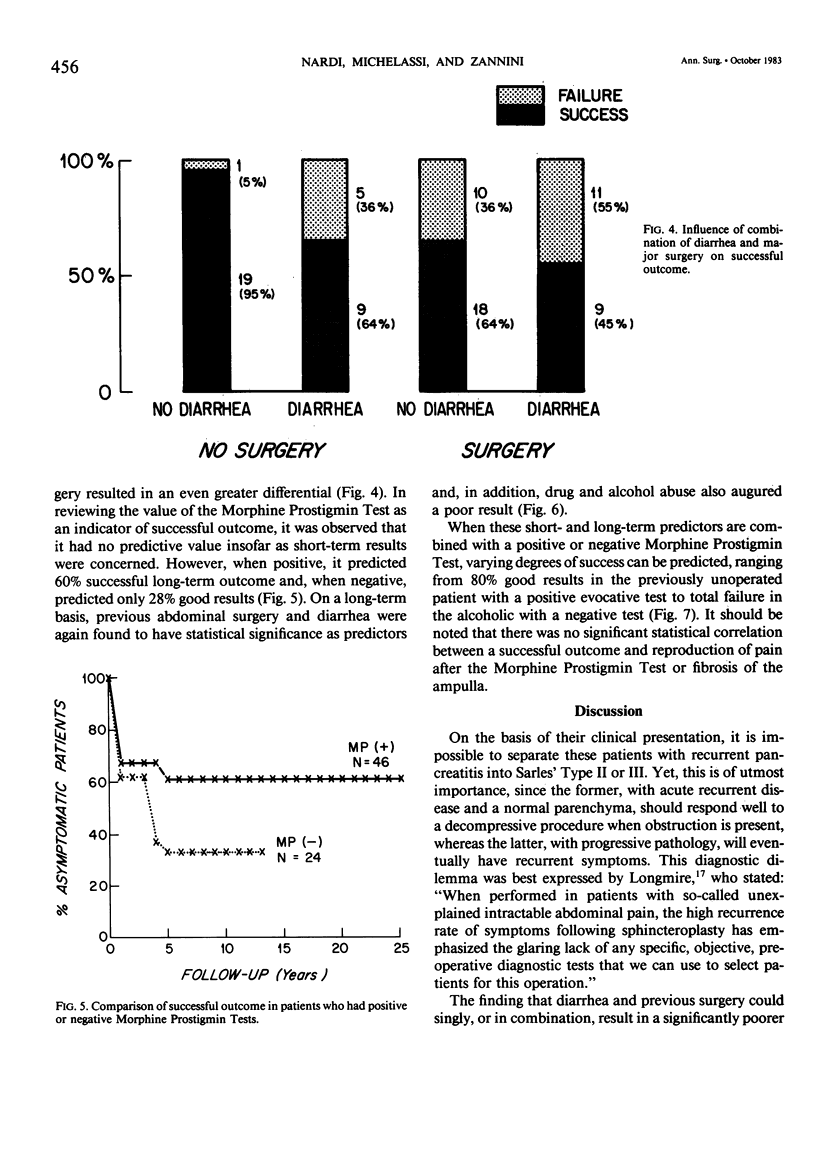
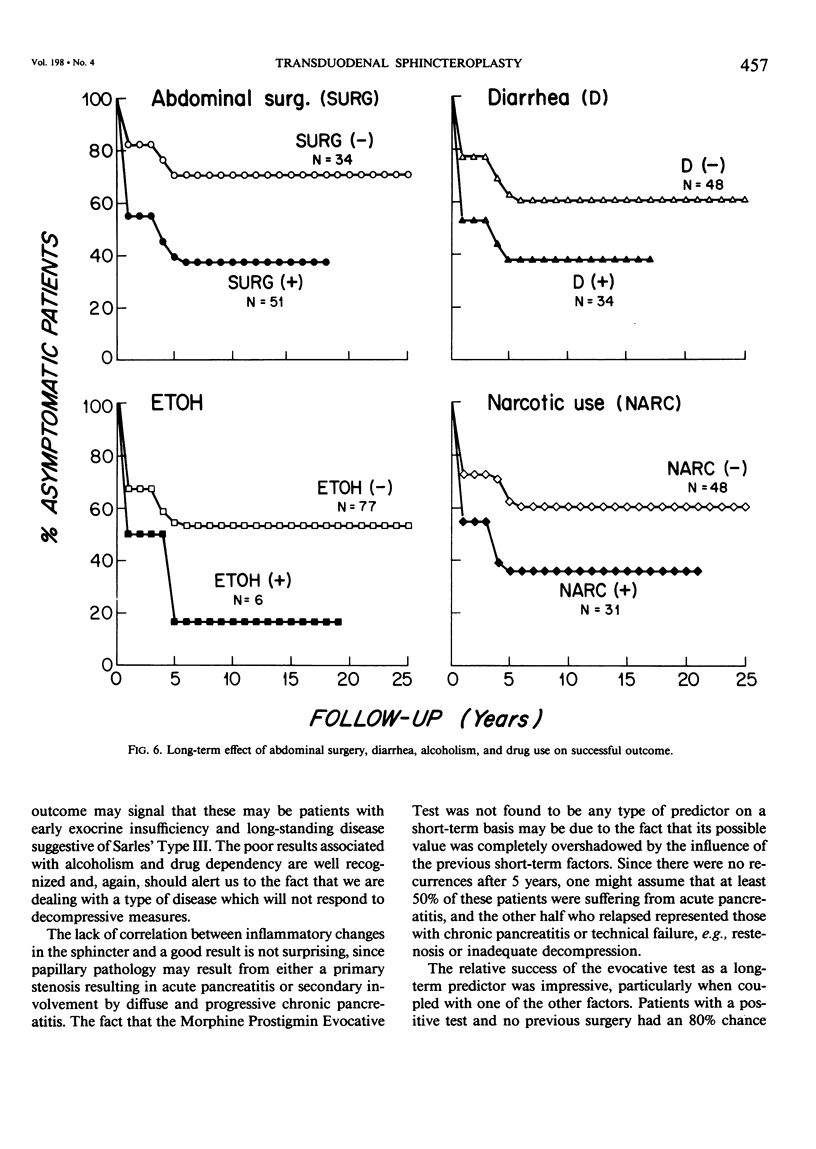
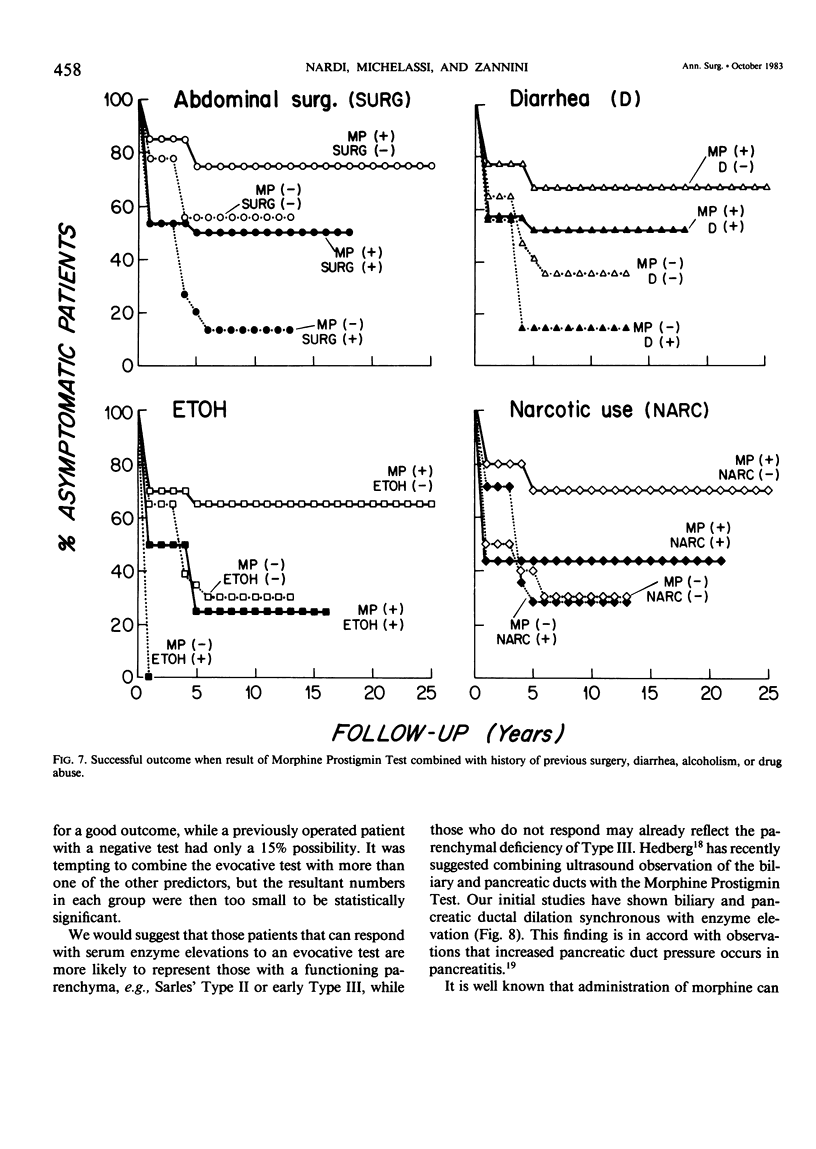
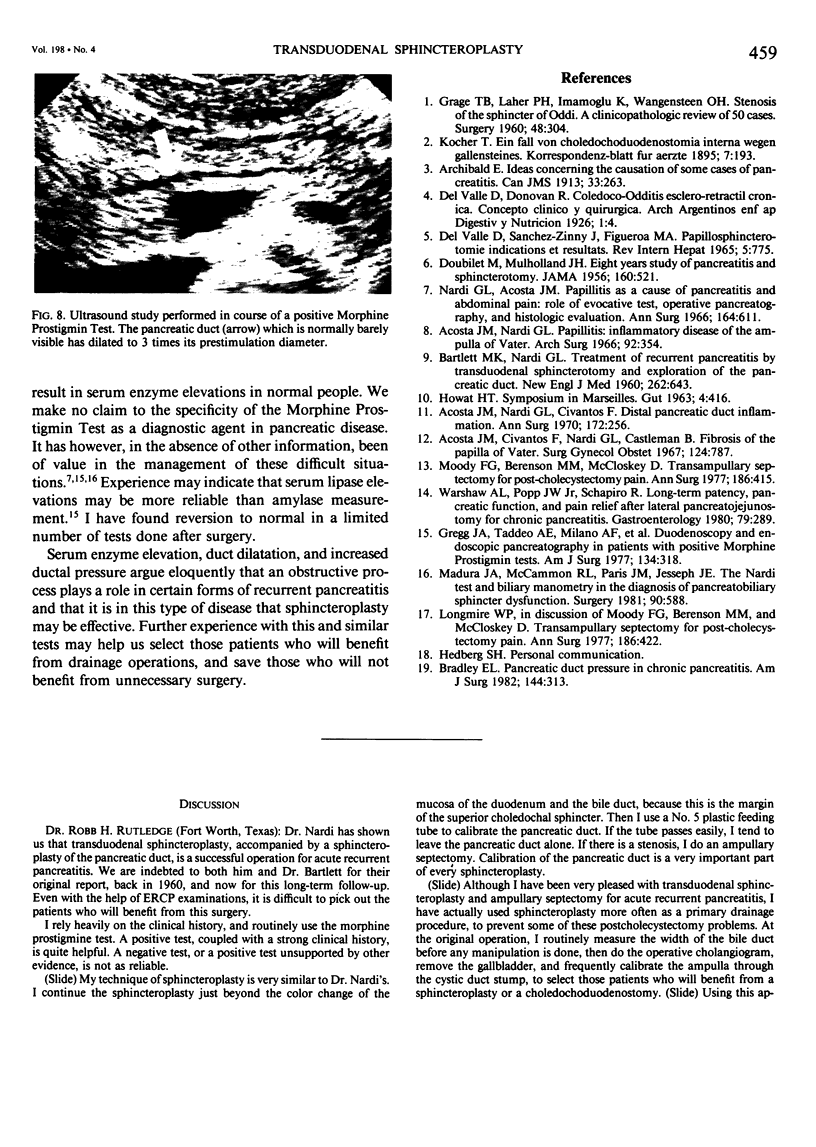
Images in this article
Selected References
These references are in PubMed. This may not be the complete list of references from this article.
- Acosta J. M., Civantos F., Nardi G. L., Castleman B. Fibrosis of the papilla of Vater. Surg Gynecol Obstet. 1967 Apr;124(4):787–794. [PubMed] [Google Scholar]
- Acosta J. M., Nardi G. L., Civantos F. Distal pancreatic duct inflammation. Ann Surg. 1970 Aug;172(2):256–263. doi: 10.1097/00000658-197008000-00012. [DOI] [PMC free article] [PubMed] [Google Scholar]
- Acosta J. M., Nardi G. L. Papillitis. Inflammatory disease of the ampulla of Vater. Arch Surg. 1966 Mar;92(3):354–361. doi: 10.1001/archsurg.1966.01320210034006. [DOI] [PubMed] [Google Scholar]
- BARTLETT M. K., NARDI G. L. Treatment of recurrent pancreatitis by transduodenal sphincterotomy and exploration of the pancreatic duct. N Engl J Med. 1960 Mar 31;262:643–648. doi: 10.1056/NEJM196003312621302. [DOI] [PubMed] [Google Scholar]
- Bradley E. L., 3rd Pancreatic duct pressure in chronic pancreatitis. Am J Surg. 1982 Sep;144(3):313–316. doi: 10.1016/0002-9610(82)90008-3. [DOI] [PubMed] [Google Scholar]
- DOUBILET H., MULHOLLAND J. H. Eight-year study of pancreatitis and sphincterotomy. J Am Med Assoc. 1956 Feb 18;160(7):521–528. doi: 10.1001/jama.1956.02960420001001. [DOI] [PubMed] [Google Scholar]
- Del Valle D., Zinny S., Figueroa M. A. Papillosphincterotomie. Indications et resultats. Rev Int Hepatol. 1965;15(5):775–781. [PubMed] [Google Scholar]
- Gregg J. A., Taddeo A. E., Milano A. F., McCartney A. J., Santoro B. T., Frager S. H., Capobianco A. G. Duodenoscopy and endoscopic pancreatography in patients with postive morphine prostigmine tests. Am J Surg. 1977 Sep;134(3):318–321. doi: 10.1016/0002-9610(77)90396-8. [DOI] [PubMed] [Google Scholar]
- Madura J. A., McCammon R. L., Paris J. M., Jesseph J. E. The Nardi test and biliary manometry in the diagnosis of pancreaticobiliary sphincter dysfunction. Surgery. 1981 Oct;90(4):588–595. [PubMed] [Google Scholar]
- Moody F. G., Berenson M. M., McCloskey D. Transampullary septectomy for post-cholecystectomy pain. Ann Surg. 1977 Oct;186(4):415–423. doi: 10.1097/00000658-197710000-00003. [DOI] [PMC free article] [PubMed] [Google Scholar]
- Nardi G. L., Acosta J. M. Papillitis as a cause of pancreatitis and abdominal pain: role of evocative test, operative pancreatography and histologic evaluation. Ann Surg. 1966 Oct;164(4):611–621. doi: 10.1097/00000658-196610000-00008. [DOI] [PMC free article] [PubMed] [Google Scholar]
- Warshaw A. L., Popp J. W., Jr, Schapiro R. H. Long-term patency, pancreatic function, and pain relief after lateral pancreaticojejunostomy for chronic pancreatitis. Gastroenterology. 1980 Aug;79(2):289–293. [PubMed] [Google Scholar]



